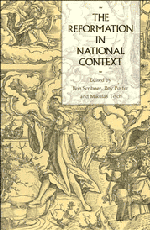4 - The Low Countries
Published online by Cambridge University Press: 04 December 2009
Summary
Introduction
During an enforced exile at Emden in East Friesland, a Calvinist from the present province of Groningen wrote a chronicle in the 1590s. The anonymous author had been forced to leave his home as a Calvinist and an opponent of the Spanish king Philip II. In his exile, he came to reflect on the history of his times. The anonymous author was clearly a Protestant. Even the flourishing of agriculture, he believed, was due to the influence of Luther and the Reformation in general, for new methods of farming were a gift from God. He suspected Catholic priests of illicit affairs with nuns, greed for money and hypocrisy. He describes the Spanish soldiery as cruel; his father had seen for himself how a Spaniard hanged a soldier. Our Calvinist also finds much to astonish him: the many exiles from England and France in Emden, the great deal of chaff among the wheat, the many Anabaptists in the Netherlands, the turbulent baptists of Munster, the followers of Franck, the divisions in Lutheranism, but above all he is amazed at the great following of the spiritualist David Joris of Delft. According to our spokesman, there was no greater tempter than this David Joris, with his many followers particularly among prominent people. Mohammed had led a wild, murderous, thieving, untaught people in the stony wastes of Arabia. David Joris, on the other hand, had not misled poor and simple people, but rich, prosperous and educated citizens of a shrewd and clever population.
- Type
- Chapter
- Information
- The Reformation in National Context , pp. 67 - 79Publisher: Cambridge University PressPrint publication year: 1994
- 1
- Cited by

